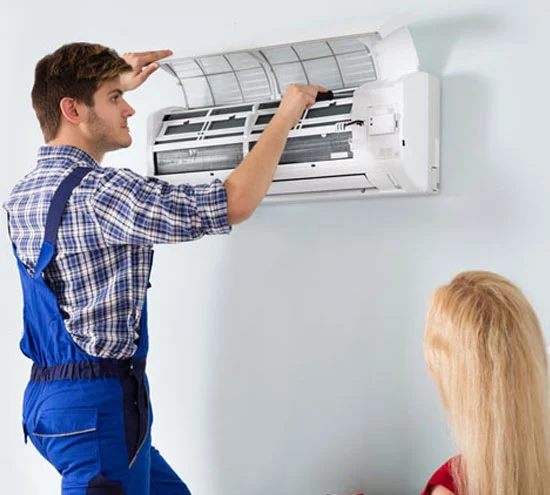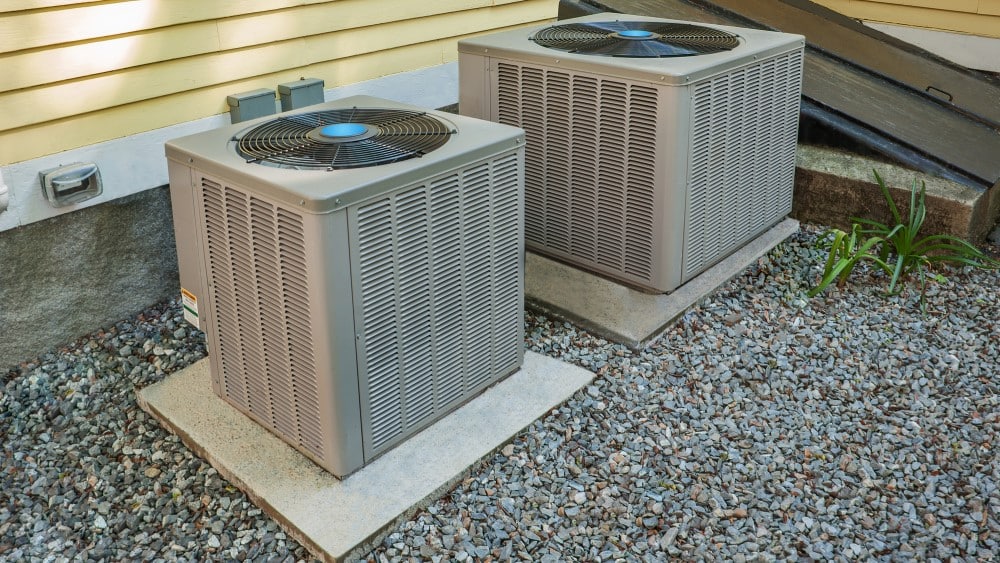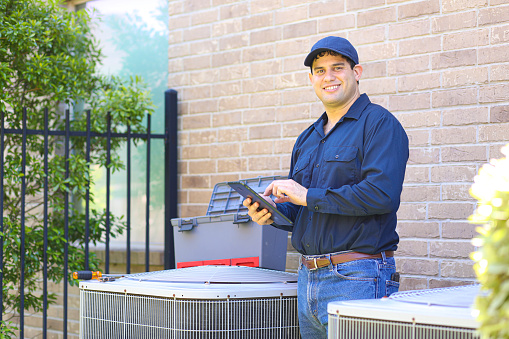As temperatures rise and the sweltering heat of summer becomes a familiar companion, air conditioning units play a pivotal role in keeping our indoor spaces cool and comfortable. In modern convenience, these devices have become essential, transforming oppressive climates into havens of respite. Yet, just like any other technological marvel, air conditioning units possess a finite lifespan. Understanding the factors influencing these systems’ longevity is crucial for efficient home management and making informed decisions about maintenance, repairs, and replacements. In this guide, we delve into the inner workings of AC units, exploring the elements that impact their durability and shedding light on strategies to maximize their operational years. Join us as we unravel the mysteries behind the lifespan of AC units and empower ourselves with the knowledge to make optimal choices for our comfort and budget.
Factors That Affect The Lifespan of AC Units
Air conditioning units have become integral to our modern lives, providing respite from the scorching heat and ensuring indoor comfort. However, like all appliances, these systems have a limited lifespan. Understanding the key factors that influence the longevity of AC units can help us extend their operational years and make informed decisions about maintenance and replacement.
Let’s delve into the essential elements that influence the lifespan of AC units.

1. Quality of Installation: The initial installation of an AC unit sets the foundation for its performance and longevity. A properly installed system ensures efficient airflow, optimal refrigerant levels, and minimal stress on components. Poor installation can lead to premature wear and tear, reducing the unit’s overall lifespan.
2. Maintenance and Care: Regular maintenance is essential to keep an AC unit running smoothly. Refrain from performing routine tasks such as cleaning or replacing air filters, clearing debris around the outdoor unit, and inspecting for leaks can lead to reduced efficiency and potential breakdowns. A well-maintained system is more likely to endure over time.
3. Usage Patterns: How often and intensely an AC unit is significantly used impacts its lifespan. Systems that constantly run at total capacity or are subjected to frequent temperature adjustments might wear out faster than those used more judiciously. Finding the right balance between cooling needs and energy conservation can extend the unit’s life.
4. Climate and Environmental Conditions: The climate in which an AC unit operates can significantly affect its lifespan. Units in scorching and humid environments might have to work harder, leading to increased component wear. Additionally, exposure to corrosive elements, like saltwater or pollutants, can accelerate deterioration.
5. Quality of Components: The longevity of an AC unit is significantly influenced by the calibre of components utilized in its manufacturing Units with durable and well-engineered parts tend to last longer and require fewer repairs.
6. Regular Inspections and Repairs: Prompt identification and resolution of issues can prevent minor problems from escalating into significant malfunctions. Regular inspections by HVAC professionals can catch and address potential problems before they cause extensive damage.
7. Technological Advancements: As technology evolves, so do the capabilities and efficiencies of AC units. Older units might need to be more energy-efficient or equipped with the latest features, which could influence their lifespan compared to newer models.
8. Manufacturer and Model: The manufacturer’s reputation and the specific model chosen can impact the expected lifespan of an AC unit. Reputable manufacturers often produce units designed for longevity and reliability.
The Lifespan of Air Conditioners Depending on the Type

Air conditioners are available in various types, each designed to cater to different cooling needs and environments.
The lifespan of air conditioning units can differ considerably depending on their type, along with considerations like usage, upkeep, and the quality of their components.
Let’s explore the typical lifespans of different types of air conditioners:
1. Central Air Conditioners: These AC systems are commonly found in larger homes and commercial buildings. These systems include an outdoor unit and ductwork that distributes cool air throughout the building. When a central air conditioner is installed correctly, it can remain operational for 15 to 20 years through diligent maintenance and attentive care. The application of routine professional assessments, filter replacements, and prompt resolution of repairs can contribute to elongating its operational duration.
2. Window Air Conditioners: Window AC units are compact units designed to fit into a window frame. These units are commonly used in apartments, smaller homes, or rooms that require individual cooling. On average, a window air conditioner can last around 10 to 15 years. The comparatively briefer lifespan of these units is frequently linked to their compact design and exposure to outdoor elements, factors that can accelerate deterioration.
3. Split/Ductless Mini-Split Air Conditioners: Ductless mini-split systems provide targeted cooling for specific zones or rooms without requiring extensive ductwork. These systems comprise an outdoor condenser unit connected to one or more indoor air-handling units. Proper maintenance ensures that a ductless mini-split air conditioner lasts around 15 to 20 years. Their modular design allows for more flexibility in replacing individual components, potentially extending the lifespan of AC units.
4. Portable Air Conditioners: These air conditioning systems offer a temporary cooling solution and can be moved from room to room. These units typically have a shorter lifespan compared to other types, ranging from 5 to 10 years. Their compact size and reliance on exhaust hoses can lead to quicker wear on internal components.
5. Evaporative (Swamp) Coolers: Evaporative coolers use natural evaporation to cool air, making them an energy-efficient option in dry climates. These units have a relatively shorter lifespan, ranging from 8 to 15 years. Their more straightforward design and reliance on water for cooling can lead to mineral buildup and corrosion over time.
6. Geothermal Heat Pumps: Geothermal heat pumps utilize the earth’s stable temperature to provide both cooling and heating. These systems have a longer lifespan than traditional air conditioners, often 20 to 25 years. Their reliance on stable underground temperatures reduces the wear and tear on components.
Is It Possible to Increase the Lifespan of Air Conditioning Systems?

Yes, it is possible to increase the lifespan of air conditioning systems through proper maintenance, care, and proactive strategies. Here are several steps you can take to extend the operational life of your air conditioning system:
1. Regular Maintenance: Scheduled maintenance is essential for keeping your AC system running efficiently and extending its lifespan. Regularly replace or clean air filters (typically every 1-3 months), cleanse the evaporator and condenser coils and verify that no obstructions impede airflow around the unit. Experienced HVAC technicians can conduct thorough maintenance inspections, detect possible concerns, and enhance the system’s operational efficiency.
2. Professional Inspections: An annual inspection of your air conditioning system by a licensed HVAC professional is crucial. They can recognize and resolve minor problems before they develop into significant issues, diminishing the probability of expensive repairs and prolonging the lifespan of AC units.
3. Optimal Usage Patterns: Using your AC system judiciously can help prolong its lifespan. Avoid constantly adjusting the thermostat and try to maintain a consistent temperature. Using programmable thermostats can help regulate temperature changes more efficiently.
4. Proper Installation: Ensure that your AC unit is installed correctly. Proper installation includes ensuring adequate airflow, insulation, and unit placement. A proper installation can lead to efficiency issues and premature wear.
5. Protect from Environmental Factors: Shield your AC unit from environmental elements such as direct sunlight, falling debris, and extreme weather conditions. This can prevent unnecessary stress on the system and protect it from corrosion.
6. Maintain Refrigerant Levels: Refrigerant is vital for the cooling process. Regularly check for refrigerant leaks and ensure your system has the correct levels. Low refrigerant levels can strain the compressor and lead to premature failure.
7. Address Repairs Promptly: If you notice any unusual noises, reduced cooling performance, or other issues, don’t delay calling for repairs. Addressing problems promptly can prevent further damage and extend the life of your system.
8. Upgrade and Replace Components: Over time, specific components of your AC system may wear out. Upgrading individual components or replacing them with more energy-efficient options can increase the lifespan of AC units.
9. Properly Sized Unit: Ensure your space’s AC system is appropriately sized. An AC unit that is either too large or too small can result in ineffective cooling, elevated energy usage, and heightened wear and tear on its components.
10. Consider Energy Efficiency: Opt for energy-efficient models when replacing your AC system. Newer systems are often designed with better technology that provides better cooling and reduces energy consumption and wear on components.
